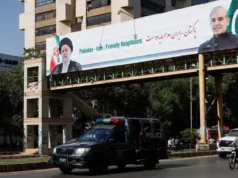
The three nuclear powers of China, India and Pakistan all have claims over various parts of Kashmir and Ladakh.
Key points:
Australia “opposes any attempts to unilaterally alter the status quo” on the border
20 Indian soldiers were killed in clashes with China last month
The dispute centres around border areas in the Himalayas
For decades, the world’s two most populous nations have fought skirmishes along a stretch of land that divides the Chinese autonomous region of Tibet from India.
Last month, India said 20 of its soldiers had been killed in clashes with the People’s Liberation Army at a disputed border site in the western Himalayas, in a major escalation of the standoff between the two nuclear powers.
An Indian army patrol had attempted to tear down temporary structures erected by the Chinese military on terrain claimed by New Delhi, setting off a brutal six-hour melee in sub-zero temperatures.
Now the ABC has learnt Barry O’Farrell, Australia’s newly appointed High Commissioner to New Delhi, has indicated the Federal Government’s support for India in the decades-long dispute.
“Australia urges restraint along the Line of Actual Control (LAC), and supports continued moves towards de-escalation,” Mr O’Farrell said in a statement issued by the High Commission this week.
“As I told the External Affairs Minister of India [on Thursday], Australia opposes any attempts to unilaterally alter the status quo, which only serve to increase tension and the risk of instability.
“It is important that the bilaterally agreed principles and norms that have helped prevent escalation or miscalculation in the border areas over many decades continue to be observed.”

Twenty Indian soldiers were killed in a clash with Chinese troops last month.
Foreign Minister urged negotiation
Since the 1960s Australia has not taken sides in the LAC dispute, but diplomatic sources said the Department of Foreign Affairs and Trade (DFAT) recently decided to clarify its public position.
When border clashes between Indian and Chinese troops turned deadly last month, Foreign Minister Marise Payne took a more cautious stance, urging both sides to “avoid confrontation”.
“Clashes between Indian and Chinese troops in the Galwan Valley, and reports of loss of life, are concerning,” she said in a statement issued on June 17.
“During a global pandemic, it is more important than ever that all countries minimise tensions and avoid confrontation in long-standing disputes.”
At the time Senator Payne added that Australia was monitoring the situation, but stressed it was a “matter for India and China to resolve through negotiation”.
So far, DFAT has declined to comment on what has prompted the clarification of its stance, or whether it has formally conveyed its latest position to Beijing.
The Government’s newly stated position on the border dispute comes amid growing expectations that Australia could soon be invited to re-join the Malabar naval exercises involving the United States, Japan and India.
The Government has strengthened its opposition to Beijing’s maritime claims in the disputed South China Sea through a formal letter to the United Nations.
The US and Australia also jointly reaffirmed their opposition to the Chinese military build-up in the disputed waters following annual AUSMIN talks in Washington.



